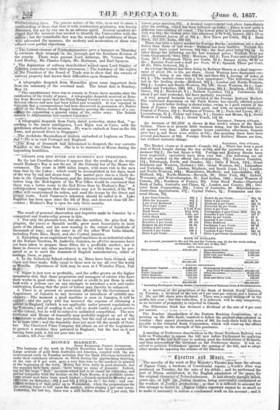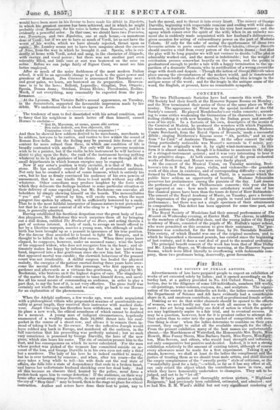tOratrts gusir,
The novelty of the week at Her Majesty's Theatre has been the advent
of Signor Corsi, a baritone of Continental repute. .Verdi's;,. Nino was produced on Tuesday, for the sake of his deliit ; and he performed the part of Nines, substituted,' in the English adaptation of the opera, for the original character of Nebuchadnezzar. It had already Signally failed, years ago, . at bOth-eiii theatres, being uniiersally_condemned as the weakest of:Veit:11'i -prOduetiOn`A ; so that it ba-diffieult to account for this attempt to revive it. .,-...Signor.COiii's repertory cannot be so small as to make it necessary to restore a condemned work on his account ; and it would have been more in his favour to have made his debfit in Rigoktto, in which his greatest success has been:achieved, and in which, he might probably rival Itone,oni,for his voice is better than Ronconi's, and he is evidently a powerful actor. In that-case; we should have two Raviatas, two TVovatores, and two itigolettos, one at each house,a monstrous dose of Verdi ;.but if we are to have so much of Verdi, let us not have the worst of his works, which we have already rejected, thrust upon us again. Mr. Lumley seems not to have been sanguine about the success of -Hino,Tfrom the way in which he _brought it out. Spezia, who is evi • dently at home with Verdi, acted and sang, imthe characterof Abigaele, with energy, and vocal power ;' but there was not another part even tolerably filled, and little care or cost was bestowed on the rinse en scene.Before we can judge fairly of Signor Corsi, we must see him better employed. After so much of the noisy feebleness of the most modem Italian school, it will be an agreeable change to go back to the quiet power and grandeur of Mozart. Don Giovanni is announced for Thursday next ; and great pains, we learn, are bestowed on its preparation. • Beneventano is to be the hero; Belletti, Leporello ; Giuglini, Don Ottavio ; Spezia, Donna Anna; Ortolani, Donna Elvira; Piccoloraini, Zorlina. Much, if not everything, may reasonably be expected from the per
formance. •
• At the Lyceum, Miss Victoire Belle's second appearance, on Tuesday, in the Sonnambula supported the favourable impression made by her debfit, We understand she is about to appear in _Lucia.
. The tendency of man to feel dissatisfied with his actual condition, and to fancy that his neighbour is much better off than himself, caused . Horace to exclaim
_ " Qui fit, Maecenas, ut nemo, quam sibi sortem : Seu ratio dederit, seu fors objeeerit, silfi Contentus vivat : laudet diverse sequentes ? " And then he showed how soldiers desired to be merchants, merchants to be soldiers, lawyers to be x-usties, and rustics to live within the sound of Roman Bow-bells. But the feeling may be pursued into forms of discanto:CA far more refined than these, in which one condition of life is
"
broadly contrasted with another. , Not only will the perverse niusician wish-to be a painter, but if the violin be his instrument he will harbour a desire to play npOn the flutethe riadeof the instrument having nahing iihitever to do the guidance of his choice. And so on through all the
:small dePartinents in which human energies may be engaged.•
. Now if any actor's position is truly enviable, it is that of Mr. Buckstone. He has actually reached the height of professional ambition. . Not only has he created a school of comic humour, which is entirely his
own, but he has so firmly convinced his audience of his own powers of 'amusement, that he can kindle them to loud mirth without any effort
whatever. Other comedians may produce laughter by the force with
which they delineate the feelings incident to some particular situation or • their delivery of some especial jest, but Mr. Buckstone can convulse all . beholders by simply showing himself on the boards. The monosyllables
"yes" and "no," uttered by him, will excite roars, when the most pungent line spoken by others, will be sufficiently honoured by a smile. That he is the most faithful interpreter of human nature is not pretended; but that he is the most comical of all who cling to a " legitimate " posi tion, is generally admitted. .
Having established his facetious despotism over the great body of Lon'don playgoers, Mr. Bncksteme this week surprises them all by bringing
out a dull drama, entitled The Husband of an Hour, and acting therein a part of serious interest. A lady of rank, to avenge an insult offered to . her by a libertine marquis, marnes a young man, who although of noble birth has been brought up as a peasant in ignorance of his true position. For the-favour thus accorded he is bound to fight the Marquis, and is thought to be killed in the conflict that ensues. When three years have elapsed, he reappears, however, under an assumed name ; wins the heart of his supposed widow, who does not recognize him in the least ; and ultimately makes her happy by informing her that he is her lawful husband, improved into a fine gentleman since she saw him last. The wound that appeared mortal was curable ; the clownish behaviour of the peasant count was not irradieable. A skilful surgeon has healed the physical malady, the energies of the patient exerted during three years have overcome the mental defect. Now this personage, who first appears as a gardener and afterwards as a virtuous fine gentleman, is played by Mr. Buckstaile,-*ho'hestows on it the highest degree of care. The singularity of the matter is, that he should consent to tame himself down, and sacrifice all his usual means of commanding an audience, in order to play a part that, to scythe best of it, is not very effective. The piece itself was certainly not worth the sacrifice, and we can only go back to our Horace for an explanation of the phenomenon. .
• When the Adelphi audience, a few weeks ago' were made acquainted with a philosophical villain who propounded maxims of questionable Morality at great length, they received their instructor with marked disfavour. Joseph Chavigny has therefore been withdrawn, and we have in its place a new work, the ethical soundness of which cannot be doubted for a moment. A young man of indigent circumstances, hopelessly enamoured of a wealthy maiden, finds 10,0001. thrust into his coat pocket in the course of a street row, and allows it to remain there instead of taking it back to the owner. Now the reflective Joseph would have robbed any bank in Europe, and murdered all the cashiers, in,the full conviction that his proceeding was perfectly natural; but no such
:easy conscience is possessed by George Darville, the hero of the new
piece; which also bears his name. The sin of omission presses him to the • dust, and has consequences on which he never calculated. 'For the man -whose 'pocket was picked of the treasure has committed suicide on ac count of the loss, and George Darville is in his own eyes not only a thief but a murderer. The lady of his love he is indeed enabled to ,marry, but he is ever tortured by remorse ; and when, after ten years—for the story takes a long while to tell—his wife finds out the real state of affairs, she falli into a state of despondency that ends in a broken heart, and leaves her unfortunate husband shrieking over her dead body. And all this because an obscure thief; hunted by the police, must force a pocket-book upon him to escape detection! If the audience on their way home after witnessing George Darville, do not avoid every skeet in which -the cry of " Stop thief ! " may be heard, then is the stage no place for ethical instruction. Anther and actors have done their best to point, nay to barb the moral, and to thrust it into every heart. The thigery of-George Darville, beginning with respectable remorse-Ind ending with wild abandonment, ia depicted by Mr. Webster in his very best manner ; and _the agony which cornea over the spirit of the wife; When in an unlucky moment she is suddenly made acquainted with her husbands delinquency, gives 'occasion for acting of extraordinary power on the part of Madame Celeste. • If only for the sake of seeing the sperforinance Of -these two favourite artists in parts exactly suited totlieir.taleilta, -.George Dayville should receive a visit from every patron of the-Modern drama ; :but.that the play will be long Popular we will net venture' to decide. kahe.plotis admirably worked out, and the Moral is indubitable; . but the weight Of retribution presses 'somewhat heavily on the spirits, and the public is goodnatured enough to prefer a tale with a happy termination to the:'apparition of a drainatio Nemesis,-.Who in rectification of a wrongeoverS the stage with death and despair. s, Though the iction of George:Darvilk takes place among the circumstances of the modem world, .and constructed with the most lordly disdain of the unities; the leading' idea is tragic in the antique sense of the word ; and for the :tragic in the antique sense of the word, the English, at present, have no remarkable sympathy.



























 Previous page
Previous page